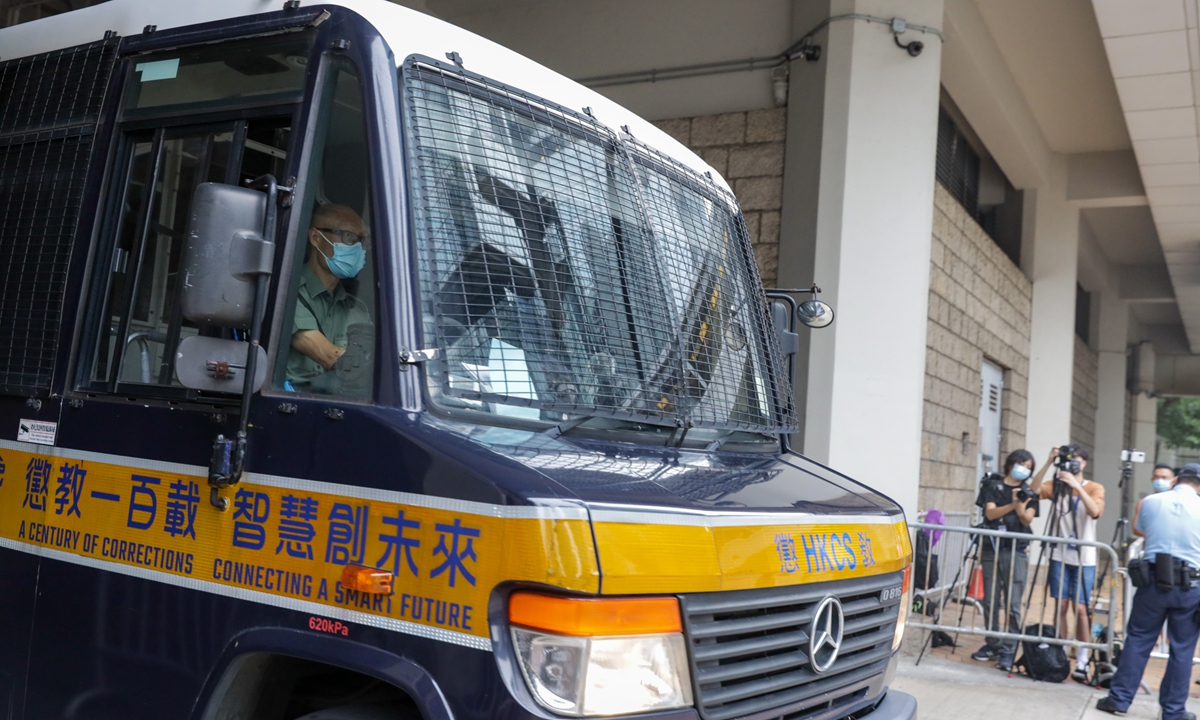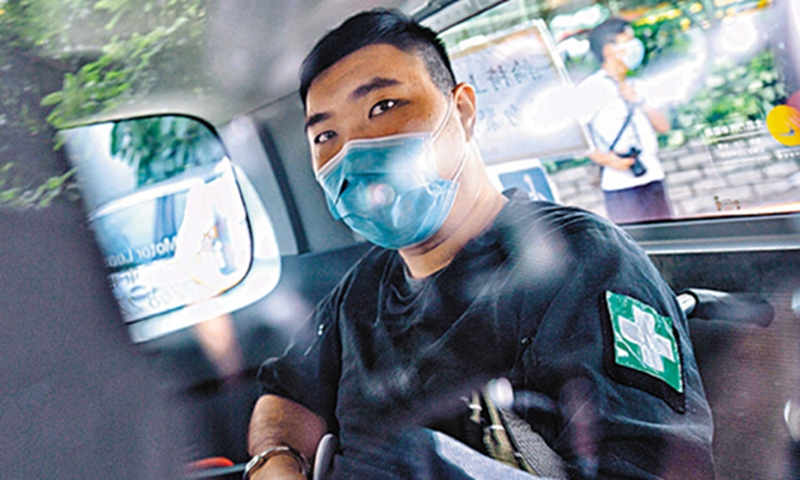HK’s first NSL verdict finds Leon Tong guilty for inciting secession and terrorism
Ruling sets precedent for upcoming national security cases

A prison van carrying Leon Tong Ying-kit leaves a court in Hong Kong on Tuesday after Tong, 24, was found guilty of inciting secessionism and terrorism under the national security law for Hong Kong. Photo: cnsphoto
Three judges have reached a decision on the first trial under the national security law for Hong Kong - Leon Tong Ying-kit was found guilty of inciting secession and terrorism. Observers noted the landmark verdict will set a precedent for upcoming national security cases including the trial of pro-secessionist media tycoon Jimmy Lai.
On Tuesday afternoon, the judges announced the verdict following a 15-day trial. The former restaurant worker became the first person to be convicted under the national security law for Hong Kong. His mitigation plea is scheduled to be heard on Thursday.
This is the first case in Hong Kong's legal history for someone to be convicted of incitement of secession and carrying out terrorist activities under the National Security Law. These offences are new and need to be dealt with to fix Hong Kong's on-going social and political dilemmas, experts told the Global Times.
In the verdict, the slogan "Liberate Hong Kong, Revolution of our Times" was deemed illegal, and observers believe the verdict will serve as a reference for future similar cases to speed up the trials, which grants Tuesday's verdict a milestone status in Hong Kong's judicial system.
Banning open instigation by displaying this slogan is also considered as a turning point that will become a warning to local secessionists who try to play word games to challenge the rule of law.
Illegal slogan
The defendant, Leon Tong Ying-kit, faced three charges, including two related to national security. Tong was arrested during a protest on July 1, 2020, a day after the national security law for Hong Kong took effect. Before the arrest, he allegedly rammed a motorcycle into three police officers, carrying a protest banner with the slogan, "Liberate Hong Kong, Revolution of our Times" (the "Liberate" slogan).
During the trial, whether the "Liberate" slogan incited secessionism has become the focus of a heated debate. Although the defense experts argued that the slogan could mean different things to different people, judges later ruled that the slogan is illegal.
"Having regard to the natural and reasonable effect of displaying the flag with the words 'Liberate Hong Kong, Revolution of our Times' on it and in the particular circumstances of this case, such display of the words was capable of inciting others to commit secession," the judges said in their ruling.
"When the defendant displayed the slogan in the manner he did, he intended to communicate the secessionist meaning of the slogan to others and he intended to incite others to commit secession by separating the HKSAR from China," says the verdict.
From this decision onwards, it is highly likely that the slogan which carries separatism message cannot be used (during protection) anymore, Lawrence Ma, barrister and chairman at Hong Kong Legal Exchange at the China Institute of International Studies, told the Global Times on Tuesday.
If a slogan is defined in the ruling and all appeal procedures are completed and the ruling is not overturned, the relevant ruling may become "facts known to the court." Thus, future cases do not need to provide evidence in order to define the slogan, Willy Fu, law professor and Vice-Chairman of Hong Kong Legal Exchange Foundation, told the Global Times.
Fu also emphasized that in every case in the future, the defendant can still seek to overturn the relevant definition.
Tong has not yet been sentenced and his mitigation plea will be heard on Thursday.
According to the national security law for Hong Kong, a person can be sentenced to a maximum of 10 years in prison for inciting, assisting in or abetting secession. A person who organizes, plans, commits, participates in or threatens to commit terrorist activities in a grave nature can face life imprisonment.

Tong Ying-kit Photo: Ta Kung Pao
Precedent for upcoming cases
This is the first verdict of the Hong Kong court after the national security law for the region came into effect more than a year ago. The case means a lot to future similar cases, Lau Siu-kai, the vice-president of the Chinese Association of Hong Kong and Macao Studies, told the Global Times on Tuesday.
The ruling clarifies some important legal principles, and shows that national security laws are not only a "law on paper" but also a "law in action," noted Wu Yingpeng, a lawyer and barrister-at-law in Hong Kong.
Legal experts also pointed out that because trial of this case was held in the Court of First Instance, the judgment is binding on the lower courts and can be used as a guideline for the District Court and Magistrates Court in the future to speed up the efficiency of the trial.
"This case not only fills in the legal loopholes in Hong Kong's common law when it comes to trial of activities that endanger national security that no case can be cited, but also forms a certain degree of deterrent effect against similar incidents in the future," Louis Chen, general secretary of Hong Kong Legal Exchange Foundation, told the Global Times.
"Also, from this judgment, the public will now know that a terrorist act does not only involve death or explosion, as long as it is a violent act done with a political agenda in mind," noted Ma.
It is also worth noting that no jury was present at the trial, as Hong Kong's justice secretary argued that a jury trial in this case would "put jurors' safety at risk." The case is instead being heard by a panel of three judges assigned by the HKSAR's Chief Executive Carrie Lam, which has started a new criminal trial mode," Chen noted.
"The jury trial is just a routine," Chen explained, "and the Department of Justice has the power to instruct the court not to set up a jury in a trial as a prosecution decision, which is guaranteed by the Basic Law."
Fu also said that since the implementation of the national security law, the cases that need to be prosecuted are "piling up" which need to be handled as soon as possible.
Since the enactment of the national security law for Hong Kong, the department of national security of the Hong Kong Police Force arrested 117 suspects who allegedly violated the national security law, from the age of 15 to 79, and among whom 64 have been prosecuted, in addition to three companies on suspicion of intruding the national security law, which have also been prosecuted, according to open data.
The trial of Jimmy Lai, who also faces national security charges, has also been extended to October 12 to the High Court on Tuesday. Lai, in addition to the charge of colluding with foreign forces, was suspected of assisting 12 Hong Kong people who were detained last August as they intended to flee to the island of Taiwan to avoid being charged for their acts during the 2019 turmoil in Hong Kong.
Experts suggested that special court could be established to handle criminal cases, like in the UK's law system.



